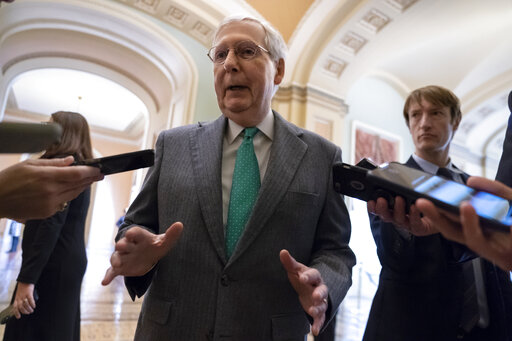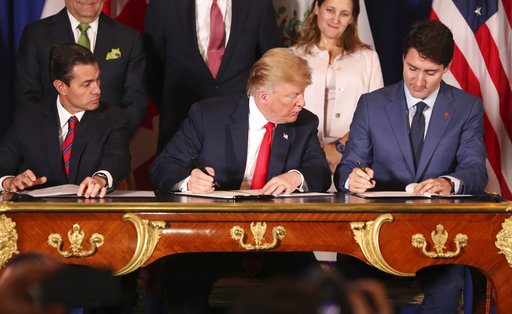What Has the House of Representatives Done Since 2016
President Donald Trump and his Republican allies accept charged that House Democrats are putting impeachment alee of their legislative duties.
It is disgraceful what the Do Nothing Democrats are doing (the Impeachment Scam), but information technology is also disgraceful what they are NOT doing, namely, the USMCA vote, Prescription Drug Cost Reduction, Gun Safety, Infrastructure, and much more!
— Donald J. Trump (@realDonaldTrump) September 29, 2019
Business firm Speaker Nancy Pelosi, D-Calif., says it is the other style around. She wrote in a recent letter to colleagues that Senate Majority Leader Mitch McConnell, R-Ky., has "scores of critical bills sitting on his desk-bound."
With impeachment grabbing the headlines, we decided to await at what else has been passing in Congress this fall. The short respond is not much, not fifty-fifty on bipartisan priorities.
Congress has only enacted 68 bills and resolutions into law, co-ordinate to Congress.gov. The last divided Congress — a Republican House and Democratic Senate under President Barack Obama — turned nearly 300 bills and resolutions into law between 2013 and 2014.
In her letter of the alphabet, Pelosi listed 3 votes she intends to hold presently and eight bills that are stalled in the Senate. Her spokesman, Drew Hammill, also cited 17 other major bills and resolutions that the House has passed or agreed to since launching its impeachment research.
House members take passed or agreed to 389 bills and 151 resolutions since Jan, when Democrats took command. Merely McConnell has left many untouched in the GOP-led Senate, having vowed to block their progressive policies as the "grim reaper" to their bills on problems such equally election security and groundwork checks.
The Senate, for its part, has passed or agreed to 132 bills and 284 resolutions since January, with 80 bills originating in its bedchamber. McConnell, whose office did not reply to our inquiry, has said his priorities include funding the government, approving Trump's North American trade deal and confirming judicial nominees.

Senate Majority Leader Mitch McConnell, R-Ky., speaks to reporters outside the chamber at the Capitol in Washington on Nov. half-dozen, 2019. (AP/Applewhite)
"There's nevertheless a lot more than piece of work that needs to be done and tin be washed in the second session," meaning the 2nd and last yr of this Congress' term, said Franz Wuerfmannsdobler, a senior adviser at the Bipartisan Policy Middle.
Funding the federal authorities
For starters, Congress is staring downwardly the possibility of another regime shutdown. The regime is being funded at last year'south spending levels under a short-term spending nib that is set to expire Nov. 21.
If Congress cannot agree on a year-long upkeep by that deadline, they will have to buy more time with another brusque-term spending bill, or else the government volition close downwards.
The House has passed 10 of the 12 appropriations bills that Congress must pass each year to fund the government's agencies, according to the nonpartisan Committee for a Responsible Federal Upkeep. The Senate has passed four of the required 12.
A short-term solution could extend last twelvemonth's budget into December or early next year, Wuerfmannsdobler said.
Just Trump could be a wild menu in the negotiations equally he faces impeachment and pushes to fulfill his entrada promise of building a border wall.
"That is definitely the unknown here, if (Trump) sees an advantage to shutting it downwards again," Wuerfmannsdobler said. "There's probably bipartisan support for keeping the extension, but yous but have to look back to last year to run across that information technology's very uncertain at this betoken."
Disagreement over funding for a border wall also played a office in the concluding government shutdown, which spanned 35 days and was the longest in U.S. history.
Drug pricing bills
Both parties accept too pushed for legislation to lower prescription drug prices, merely they have not agreed on a specific course of action.
Firm Democrats are moving forward with a major bill that they renamed in honor of the late Rep. Elijah Cummings of Maryland, who died in October. The House beak aims to lower prescription drug prices for seniors past letting Medicare negotiate direct with drugmakers and setting a new maximum out-of-pocket toll for Medicare patients.
According to a preliminary assay from the nonpartisan Congressional Upkeep Office, the bill would reduce federal spending on Medicare past approximately $345 billion over 10 years, with most savings resulting from a provision requiring manufacturers of certain drugs to negotiate prices with the federal government based on average prices internationally.
The CBO likewise estimated that drug manufacturers would lose money and scale back spending on research, which could result in viii to 15 fewer new drugs being introduced over ten years.
In the Senate, a bipartisan bill from Sen. Chuck Grassley, R-Iowa, would require drug companies to pay rebates to Medicare if they raise prices across the inflation rate, and create a maximum out-of-pocket cost for Medicare patients. Simply it would non let Medicare negotiate prices.
Trump tweeted back up for both bills in September. But the side by side month, he called Pelosi'south efforts "camouflage" for impeachment. The Associated Printing reported that the White House now considers the House version "unworkable," meaning Congress could be at an impasse.
Nancy Pelosi just said that she is interested in lowering prescription drug prices & working on the desperately needed USMCA. She is incapable of working on either. Information technology is just cover-up for trying to win an ballot through impeachment. The Practice Goose egg Democrats are stuck in mud!
— Donald J. Trump (@realDonaldTrump) October 2, 2019
Withal, the House Ways and Means Commission approved the House version on Oct. 22. Hammill said Pelosi will likely schedule a full vote for November or December.
Matthew Fiedler, a health economist at the Brookings Establishment, said he is "hundred-to-one" that any meaningful drug pricing legislation volition laissez passer in the almost future, since the White Business firm opposes the Firm bill and many Democrats view the Senate culling as a "half measure."
Fielder said the House nib makes much more key changes that would lead to larger reductions in drug prices than the Senate nib. But both versions would reduce federal spending on prescription drugs, lower prices and lead to more overall usage.
Stacie Dusetzina, professor of health policy at Vanderbilt University, said that loftier public involvement makes her hopeful for a solution.
"Medicare beneficiaries, in particular those who have very loftier spending today, would encounter some important changes in what they pay for their drugs," she said.
The U.S.-Mexico-Canada Understanding
Both Pelosi and McConnell have listed the U.South.-Mexico-Canada Agreement, the merchandise bargain Trump negotiated concluding year to replace the North American Costless Trade Agreement, as a legislative priority.
The USMCA was signed by Trump but awaits congressional approval. It was expected to take effect at the beginning of 2020.

President Donald Trump signs the United States-Mexico-Canada Agreement alongside Canadian Prime Minister Justin Trudeau and Mexican President Enrique Pena Nieto in Buenos Aires, Argentina, on Nov. 30, 2018. (AP/Mejia)
The deal would expand the United states of america' achieve into Canada's milk and pharmaceutical markets, strengthen labor and environmental rights, broaden protections over intellectual belongings, and take steps to increment the share of Due north American parts used in making cars.
"This is the Trump administration'southward renegotiation of NAFTA," said Edward Alden, a senior swain at the Council on Foreign Relations.
The timeline for approval will likely depend on negotiations over the agreement, but Alden said it is "not terribly urgent" because NAFTA will remain in effect until the USMCA gets ratified.
"The Democrats take historically been extremely divided on trade in full general and NAFTA in detail," he said, so Pelosi will have to decide whether information technology's "worth dividing the political party." She has said Democrats desire to secure stronger worker and environmental protections in the bargain.
"Pelosi has said that at that place ought to be a path to yes," he added. "I'm just not clear at the cease of the day in that location is."
The Voting Rights Advancement Act
Another priority for Pelosi and House Democrats is the Voting Rights Advancement Act of 2019, a House bill to restore provisions from the Voting Rights Act of 1965 that the Supreme Courtroom struck down in 2013. A companion beak exists in the Senate.
The example, Shelby Canton vs. Holder, invalidated provisions in the 1965 human action that required states and local governments with histories of voter suppression to become federal preclearance before changing their voting laws. The House beak would re-implement like requirements.
The bill was reported out of committee October. 23, and Hammill said it should be brought to a full vote this month. But Senate Republicans are not expected to motion on it, in part because of a provision requiring automatic preclearance of voter ID laws, according to Bloomberg Law.
House bills stuck in the Senate
In addition to the merchandise deal and bills on drug pricing and voting rights, Hammill said the SHIELD Act passed Oct. 23 and the Protect Against Conflict by Turkey Act passed Oct. 29 have been priorities for House Democrats. We counted nearly 300 Business firm bills that are stuck in the Senate.
The SHIELD Act would require political campaigns to report foreign election interference, while the PACT Act would put sanctions on Turkey related to its war machine invasion of northern Syria.
Beyond that, Pelosi'southward letter cited eight of the Business firm bills McConnell has stalled in the Senate:
• The For The People Act would make Election Solar day a federal holiday, expand voter registration, restrict the removal of voters from voter rolls, and create programs to encourage small-dollar political donations.
• The Bipartisan Groundwork Checks Act would ban the private transfer of firearms without a licensed background check.
• The Paycheck Fairness Act would strengthen penalties for employers that discriminate on the basis of gender.
• The VAWA Reauthorization Human action would reauthorize the 1994 Violence Confronting Women Human activity, which protects victims on domestic violence, for v years.
• The Climate Action Now Human activity would prohibit the use of federal money to withdraw the United States from the Paris Agreement on climate change.
• The Equality Deed would protect LGBTQ people from discrimination in housing, the workplace and public accommodations.
• The Dream and Promise Human action would grant certain young undocumented immigrants who came to the United States equally children a path to permanent residency status.
• The Raise the Wage Act would bring the minimum wage to $fifteen per hour later on six years.
Senate bills stuck in the House
Of the 80 bills that started in the Senate and passed, we counted 58 that the Business firm has not too passed, although many of those have been sent to diverse committees for consideration.
McConnell'southward office did non respond to our request for examples of Senate priorities the House is blocking. 1 major Senate proposal Pelosi refused to consider was the Strengthening America'due south Security in the Center East Act, which Republicans introduced in January.
The bill would allow local and state governments to penalize companies for boycotting Israel, extend support to Jordan and slap more sanctions on supporters of the Syrian regime. Democrats in both chambers dismissed the bill on costless speech grounds, but the Firm subsequently passed a far less sweeping resolution to condemn the boycott-Israel move.
Source: https://www.politifact.com/article/2019/nov/14/what-congress-doing-besides-impeachment/
0 Response to "What Has the House of Representatives Done Since 2016"
Postar um comentário